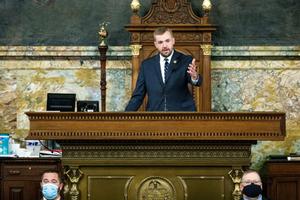This article is made possible through Votebeat, a nonpartisan reporting project covering local election integrity and voting access. This article is available for reprint under the terms of Votebeat’s republishing policy.
HARRISBURG — More than 60 Republicans including the top lawmakers in the Pennsylvania House are asking the state’s congressional delegation to reject electors for Joe Biden after conceding the General Assembly could not appoint its own.
GOP lawmakers sent a letter to the state’s U.S. representatives and senators Friday, claiming that Gov. Tom Wolf and the secretary of the commonwealth “undermined” the state’s new vote-by-mail law and the certification of its Electoral College delegation.
Even though state and county election officials — as well as President Donald Trump’s own justice department — have said the November election was conducted without major irregularities, mail ballots have become a flashpoint for GOP members trying to block the election’s results.
Pennsylvania certified Democrat Joe Biden as the state’s presidential winner in late November, with official results showing the former vice president defeated Trump by 80,555 votes.
To start the process of rejecting electors, at least one U.S. House member and one U.S. senator would have to sign an objection, according to the Congressional Research Service. It would then have to be accepted by both the U.S. House, which is controlled by Democrats, and the GOP-led U.S. Senate
In a statement to the Associated Press, Republican Sen. Pat Toomey’s office said he “will not be objecting to Pennsylvania’s slate of electors.” Pennsylvania’s other U.S. senator, Bob Casey, is a Democrat.
With bipartisan support, the legislature in 2019 approved no-excuse mail voting as part of a long-awaited update to the Election Code. November was the first general election during which universal mail voting was an option in the state, and more than 2.5 million people opted to vote that way.
“Unfortunately, Governor Wolf and others quickly set about undermining the many protections provided under this law,” the letter, signed by House Speaker Bryan Cutler (R., Lancaster) and House Majority Leader Kerry Benninghoff (R., Centre), reads.
The lawmakers claim guidance from the Department of State and Secretary of the Commonwealth Kathy Boockvar on how to treat mail ballots with issues — like a missing signature or secrecy envelope — undermined the intent of the law, which is in fact silent on whether counties should allow voters to “cure” ballots.
They also note that the law requires mail ballots to be received by 8 p.m. Election Day in order to be counted. But at the request of state Democrats, the Pennsylvania Supreme Court extended the deadline by three days, citing possible delays with the U.S. Postal Service and an anticipated surge in voter turnout. Roughly 10,000 ballots were received during that extended window.
Republicans say the Democrat-controlled court legislated from the bench and usurped lawmakers’ power.
That’s just one of many court battles that have played out both before and after Nov. 3, as the Trump campaign seeks to translate unsubstantiated claims of voter fraud into victories that would block large batches of ballots or even the certification of results. Republicans have failed to score any major victories.
And despite performing well down-ballot, GOP lawmakers in Pennsylvania have claimed the election was sullied by “chaos and confusion.” Still, Republican leadership in the state for months has denied they would interfere with the tradition of appointing electors to the highest vote-getter.
They repeated that position in a letter Thursday, writing that the state’s Election Code does not allow such a maneuver. “It would also set a precedent that a simple majority of the General Assembly can override the will of the people as evidenced by the popular vote,” the letter read.
Still, Republicans have asked for post-election investigations, a special session, and for Attorney General Josh Shapiro to appoint “an independent prosecutor to review … election irregularities.”
In a tweet, Shapiro said he is not empowered to make such an appointment under state law or the Pennsylvania constitution.
A spokesperson for Wolf said the U.S. Department of Justice has not identified significant voter fraud in Pennsylvania, and lawmakers “pretending otherwise should be rejected by all of us.”
“This is just another attempt by the Republicans to spread misinformation and disenfranchise voters,” the spokesperson, Lyndsay Kensinger, said. “Pennsylvanians would be better served if legislative Republicans would spend as much time helping to protect them during the pandemic as they do spreading conspiracy theories about the election.”
Rep. Malcolm Kenyatta (D., Philadelphia), who serves on the House committee that considers election legislation, said Republicans “are playing with fire” and “destroying our democracy to help their political prospects.”
Electors from across the country are scheduled to meet in their respective capitals at noon on Dec. 14. In Harrisburg, 20 electors are expected to cast their votes for Biden and Vice President-elect Kamala Harris.
Electors are typically state and local elected officials, party leaders, and others who traditionally have strong connections to the party. Shapiro and Kenyatta are among Biden’s appointed electors.
A spokesperson with Boockvar’s office said details of the electors’ meeting in Harrisburg are still being worked out to adhere to safety protocols related to COVID-19.
100% ESSENTIAL: Spotlight PA relies on funding from foundations and readers like you who are committed to accountability journalism that gets results. Become a member today at spotlightpa.org/donate.
